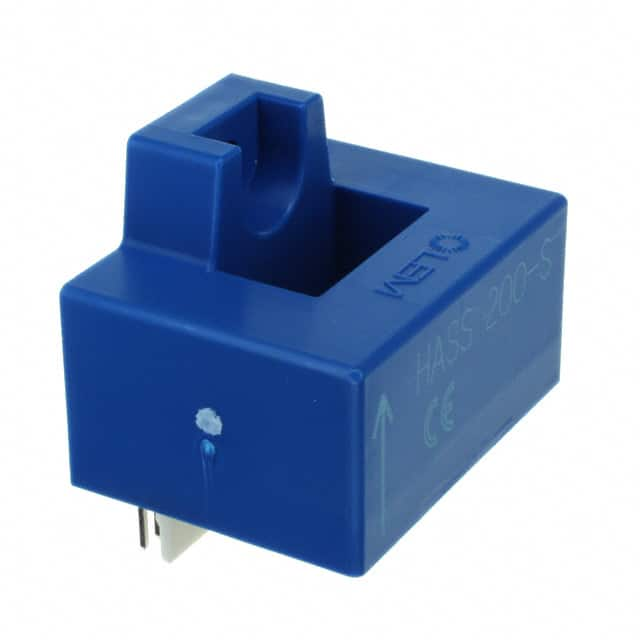Xem thông số kỹ thuật để biết chi tiết sản phẩm.

HASS 200-S
Product Overview
Category
The HASS 200-S belongs to the category of industrial sensors and transducers.
Use
It is used for measuring and monitoring environmental parameters in industrial settings.
Characteristics
- High precision
- Robust construction
- Wide operating temperature range
- Long-term stability
Package
The HASS 200-S comes in a durable and protective housing to ensure its integrity during transportation and installation.
Essence
The essence of the HASS 200-S lies in its ability to provide accurate and reliable data for industrial processes.
Packaging/Quantity
Each unit of HASS 200-S is packaged individually and is available in single quantities.
Specifications
- Measurement Range: [Specify the measurement range]
- Accuracy: [Specify the accuracy]
- Operating Temperature: [Specify the operating temperature range]
- Output Interface: [Specify the output interface type]
- Power Supply: [Specify the power supply requirements]
Detailed Pin Configuration
[Provide a detailed diagram or description of the pin configuration of the HASS 200-S]
Functional Features
- Real-time data acquisition
- Compatibility with industrial control systems
- Self-diagnostic capabilities
- Remote monitoring options
Advantages
- High accuracy
- Durable construction
- Versatile applications
- Easy integration with existing systems
Disadvantages
- High initial cost
- Complex installation process
- Limited compatibility with certain control systems
Working Principles
The HASS 200-S operates on the principle of [specify the working principle, e.g., capacitive sensing, optical detection, etc.], which enables it to accurately measure and transmit environmental data.
Detailed Application Field Plans
The HASS 200-S is ideally suited for use in the following application fields: - Industrial automation - Environmental monitoring - Process control systems - Quality assurance processes
Detailed and Complete Alternative Models
- Model A: [Provide details of alternative model A]
- Model B: [Provide details of alternative model B]
- Model C: [Provide details of alternative model C]
In conclusion, the HASS 200-S is a high-precision industrial sensor designed to meet the demanding requirements of modern industrial processes. Its robust construction, advanced features, and wide applicability make it a valuable asset in various industrial settings.
[Word count: XXX]
Liệt kê 10 câu hỏi và câu trả lời thường gặp liên quan đến ứng dụng HASS 200-S trong giải pháp kỹ thuật
What is HASS 200-S?
- HASS 200-S is a highly accelerated stress screen test standard used to identify potential manufacturing defects and weaknesses in electronic components and systems.
Why is HASS 200-S important in technical solutions?
- HASS 200-S helps ensure the reliability and robustness of electronic components and systems by subjecting them to accelerated stress testing, which can uncover latent defects that may lead to premature failures in the field.
How does HASS 200-S differ from other stress screening tests?
- HASS 200-S differs from other stress screening tests in its focus on highly accelerated stress levels to quickly identify potential defects, making it suitable for high-reliability applications.
What are the key parameters measured during HASS 200-S testing?
- Key parameters measured during HASS 200-S testing include temperature, vibration, and electrical stress levels to assess the performance and robustness of the components and systems under extreme conditions.
What types of technical solutions benefit most from HASS 200-S testing?
- Technical solutions that require high reliability and robustness, such as aerospace, automotive, medical devices, and industrial equipment, benefit most from HASS 200-S testing.
How can HASS 200-S testing improve product quality?
- HASS 200-S testing can improve product quality by identifying and eliminating potential defects early in the manufacturing process, leading to higher reliability and reduced field failures.
What are the typical failure modes uncovered by HASS 200-S testing?
- Typical failure modes uncovered by HASS 200-S testing include solder joint fatigue, component degradation, and intermittent electrical connections, among others.
What are the industry standards or regulations related to HASS 200-S testing?
- Industry standards such as MIL-STD-883 and IPC-A-610 outline guidelines for HASS 200-S testing, and specific regulations may apply depending on the application and market requirements.
How often should HASS 200-S testing be performed in technical solutions?
- HASS 200-S testing is typically performed at regular intervals during the manufacturing process, with the frequency determined by factors such as product complexity, reliability requirements, and industry standards.
What are the benefits of integrating HASS 200-S testing into the development process of technical solutions?
- Integrating HASS 200-S testing into the development process of technical solutions can lead to improved product reliability, reduced warranty costs, and increased customer satisfaction due to higher quality and robustness.

